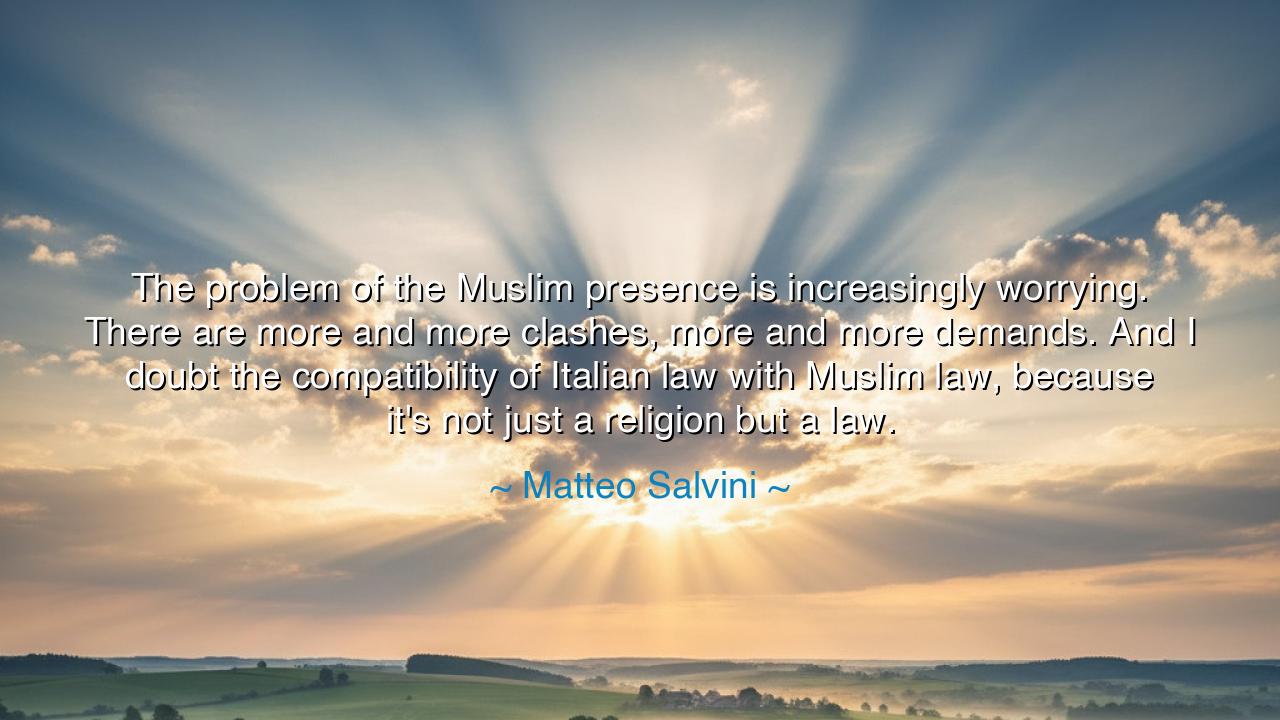
The problem of the Muslim presence is increasingly worrying.
The problem of the Muslim presence is increasingly worrying. There are more and more clashes, more and more demands. And I doubt the compatibility of Italian law with Muslim law, because it's not just a religion but a law.






The words of Matteo Salvini—“The problem of the Muslim presence is increasingly worrying. There are more and more clashes, more and more demands. And I doubt the compatibility of Italian law with Muslim law, because it's not just a religion but a law.”—emerge from the fires of politics and fear, spoken in the voice of one who sees conflict in the meeting of cultures. They reveal a tension that has existed across centuries: the meeting of differing systems of belief, governance, and identity. In these words lies both a warning and a challenge: how shall nations reconcile the demands of tradition with the reality of diversity, and how shall peoples live together when their laws and faiths do not always align?
The origin of this statement lies in Salvini’s role as a populist leader in Italy, a nation that has in recent decades become a crossroads of migration. The influx of Muslim communities into a predominantly Catholic land stirred debates over integration, identity, and law. Salvini gave voice to those fears, casting Islam not merely as a religion, but as a legal and cultural system potentially at odds with Italy’s secular constitution. His words reflect not only his own stance, but the broader unease that often arises when traditions meet upon contested ground.
History has many mirrors to this dilemma. In medieval Spain, Christians, Muslims, and Jews lived side by side under varying degrees of tolerance and tension. At times, the coexistence produced flourishing art, science, and philosophy. At other times, mistrust and fear boiled over into persecution and exile, as rulers doubted whether different laws and beliefs could truly live together. Salvini’s words echo those ancient doubts, the suspicion that two ways of life may not find harmony when they both seek to govern the same space.
Yet the heart of this matter is not only about law, but about fear and identity. Religion, when it extends into social order, shapes family, justice, and daily life. When two systems of law and tradition meet, there is the danger of collision. But history also shows that such encounters can lead not only to conflict, but to growth. From the translations of Arabic texts in Toledo that shaped Europe’s Renaissance, to the Ottoman millet system that allowed diverse communities to coexist, there are stories where difference, though fraught, became fertile ground.
Salvini’s words carry a heroic weight of caution, but they also risk fanning the flames of division. To see Islam only as threat, and not also as faith, culture, and humanity, is to risk reducing millions of lives to an enemy. The ancients would remind us that fear blinds the eye, but wisdom requires seeing both danger and opportunity. For while incompatibility is possible, so too is adaptation, dialogue, and the weaving of a shared civic fabric. The question is not merely whether laws align, but whether hearts are willing to seek a common ground.
The lesson here is twofold: vigilance is necessary, but so too is humility. A nation must defend its laws, its liberties, its identity. But it must also recognize that communities who arrive with different traditions are not shadows, but people—families, children, seekers of a future. To dismiss them outright is to close the door to understanding; to embrace without discernment is to invite confusion. The balance lies in justice: holding firm to the core principles of the state while engaging differences with both courage and compassion.
Practically, this means fostering honest dialogue between traditions, ensuring that secular law remains supreme in civic matters, but also allowing space for cultural and religious expression that does not threaten that law. It means investing in education, so that ignorance does not become the fuel of fear. And it means refusing to reduce millions to stereotypes, for every religion is larger than its extremes.
Thus, Salvini’s words are not only a warning of conflict but a challenge to the future: how shall diverse peoples live together under one law? The ancients would answer: through vigilance, through justice, through the courage to stand firm, and the wisdom to reach across divides. For if law is the structure of a nation, then mutual respect is the mortar that binds its stones, without which no house can stand.






AAdministratorAdministrator
Welcome, honored guests. Please leave a comment, we will respond soon